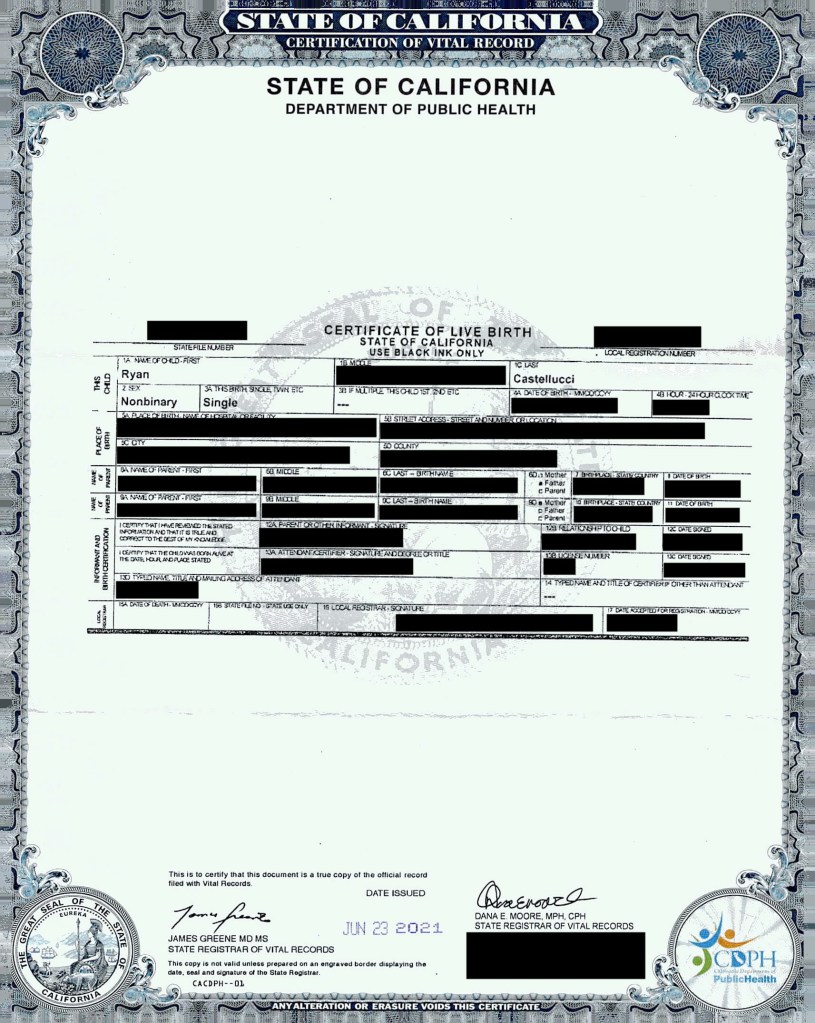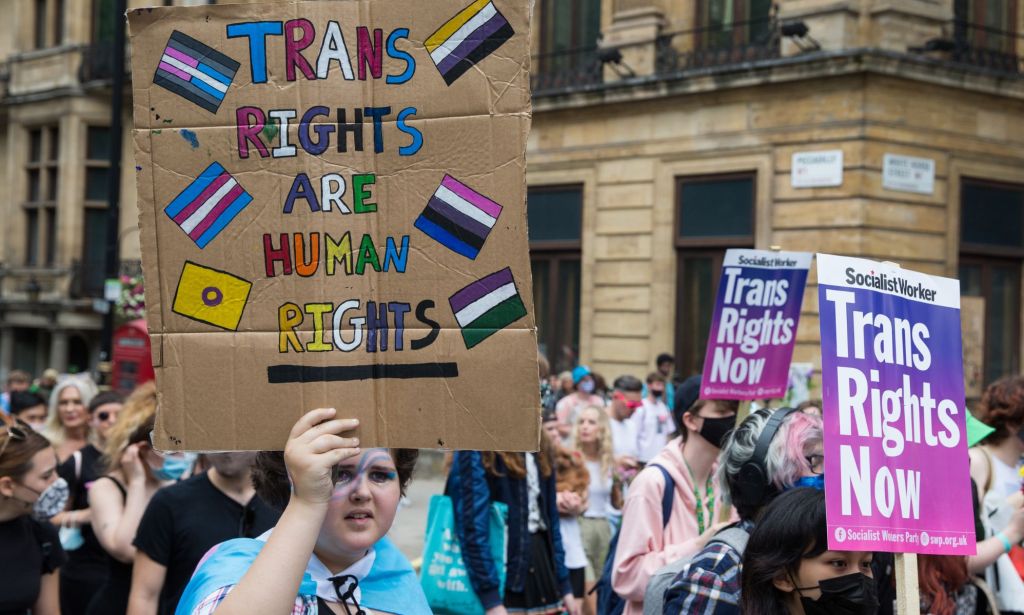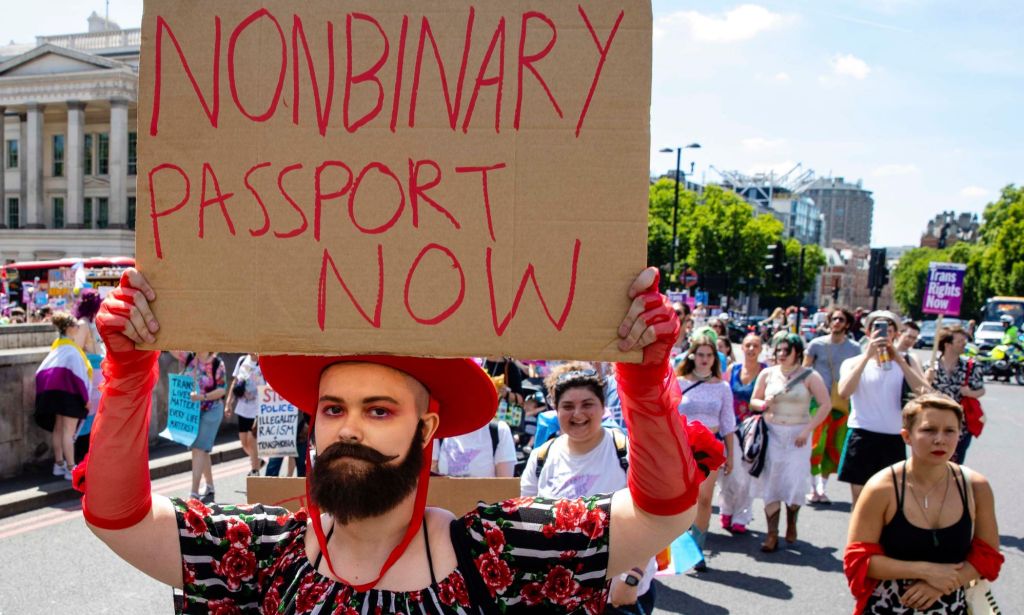UK can’t deny non-binary people forever, says US ex-pat fighting in court for legal recognition

Non-binary American Ryan Castellucci launched a legal challenge to get their non-binary identity legally recognised in the UK. (Ryan Castellucci)
Non-binary American Ryan Castellucci launched a legal challenge to get their non-binary identity legally recognised in the UK. (Ryan Castellucci)
The UK “cannot refuse to provide legal recognition for non-binary people forever”, says an American challenging the UK government in court for accurate documentation.
Ryan Castellucci moved to the UK from the US in 2019, and has built a life here with their partner.
They are non-binary, something that is reflected on their California birth certificate and driving licence.
However, they have so far been unable to have their gender legally recognised in the UK. While trans foreign nationals who’ve had their gender recognised overseas can apply for a UK Gender Recognition Certificate (GRC), providing their country is on an approved list, there isn’t a ‘non-binary’, ‘X’ or ‘gender-neutral’ gender marker option.
Having tried and failed to navigate this minefield, Castellucci has launched a first-of-its-kind legal battle to have their gender legally recognised, one they’re prepared to take all the way to the Supreme Court.
The American first applied for a GRC in April, and their application triggered a back-and-forth with the Gender Recognition Panel (GRP). Made up of legal and medical professionals, the panel assesses and gives approval to GRC applications.
The panel approved the application and told Castellucci that they could choose for ‘male’, ‘female’ or ‘non-specified’ to be listed on their Gender Recognition Certificate.

When asked about the legal ramifications of having a ‘non-specified’ gender marker, the panel was unable to offer clarity, Castellucci tells PinkNews.
They argue there’s no reason under British law why they shouldn’t be entitled to a non-binary GRC given their identity is recognised in the US.
“After feeling just kind of annoyed that everybody kept saying, ‘Oh well, you have to be a binary gender legally in the UK’ and nobody provided citations, I looked, and there weren’t any,” they say.
“Then I read the Gender Recognition Act (GRA), and it pretty clearly recognises arbitrary genders.”
Ryan Castellucci instructed a legal team from Leigh Day to contest the panel’s response and bring clarity to what they’ve described as a “legally ambiguous” situation.
It’s their hope that, if they win, it will pave the way for non-binary people in the UK to have the option of getting a GRC that legally recognises their authentic self.
They’re aware that they may not win – non-gendered campaigner Christie Elan-Cane has fought for decades to obtain a UK passport with an ‘X’ gender marker. Elan-Cane’s case made it all the way to the UK Supreme Court in 2021, where it was “unanimously dismissed”, with an appeal since lodged at the European Court of Human Rights in Strasbourg, France.

“I suppose the first thing is that I will win – not necessarily this legal case, of course, there’s no guarantee of that,” Castellucci says.
“But the UK cannot refuse to provide legal recognition for non-binary people forever, eventually they will relent. There is no question about that.
“Eventually, it becomes an international human rights issue where they start looking bad after everybody else is recognised.
“There’s only so far that’s going to last, so this case to me is really about just accelerating the timeline.”
Ultimately, they say they have other things they’d rather do with their time than “fighting the government on this”. They think it’s a “waste of taxpayer resources” for the government to oppose them on this issue because “all they can do is delay”.
Castellucci expects the legal battle to appeal all the way to the UK Supreme Court, but they didn’t want to “live with the regret” of not fighting for non-binary legal recognition.

And as the legal battle continues, they recognise that they will be smeared in the right-wing British press, which has become increasingly hostile towards trans people.
Castellucci says the decision to waive their right to request anonymity came down to them leaning-in to being open about their journey and humanising their legal battle.
“I’m not like this stereotype people have of non-binary people,” they say. “I’m a pretty normal person.
“I have a normal career. I have a partner. We’re planning to settle down and have a family. It’s pretty normal.
“And if I were anonymous in this case, it would be really easy for people to just build up a straw enby, if you will, to attack.
“But instead, they have to attack me.”

Castellucci, a cybersecurity expert, adds: “They’re going to talk. They’re going to say bad things about me. A bunch of people have been doing Google searches for my name and clicking on my website and like … I am just a nerd with a successful tech career.
“I happen to be non-binary, and that’s who I am. And they can’t take that away from me.”
Under Theresa May, the British government did consider whether to expand gender recognition laws to include non-binary people. But the plan was deemed too “legally complex” before eventually being abandoned entirely by her successor, Boris Johnson.
An Equality Hub spokesperson told PinkNews that the “gender recognition process in UK law only allows a change of sex from male to female or vice versa”.
“We listened to those who responded to the GRA consultation and have taken steps to modernise the way that individuals can apply for a Gender Recognition Certificate as a result, including reducing the cost and moving the process online,” the spokesperson added.
“Given the ongoing legal proceedings in this case we won’t be commenting any further on this individual case.”

